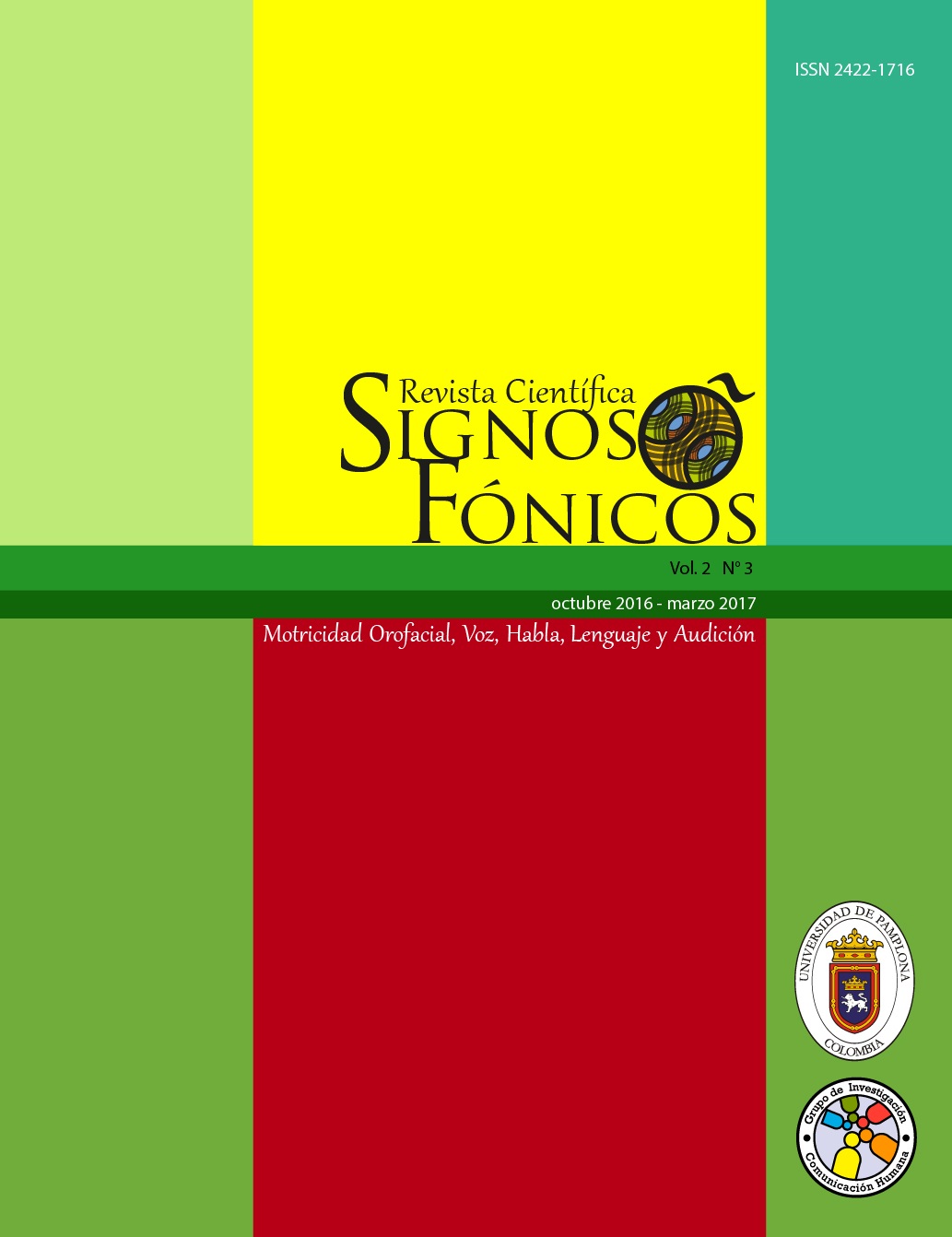Remitting Recurrent Multiple Sclerosis: Clinical Assessment findings from a kinesiological and Speech pathologist perspective
DOI:
https://doi.org/10.24054/rcsf.v1i3.2088Keywords:
Multiple sclerosis, relapsing-remitting,, speech Therapy, Physical TherapyAbstract
INTRODUCTION: Multiple sclerosis is a demyelinating, multicenter, progressive and fluctuating autoimmune disease that affects central nervous system and it causes disability among young adults. To describe the findings of the physical examination of a relapsing-remitting multiple scle-rosis (RRMS) patient, from a physical and speech therapy view. METHOD: Non-experimental descriptive cross-sectional design. The subject has an early stage (RRMS), which was diagnosed with specific guidelines. RESULTS: The patient shows cognitive, communicative, motor, respi-ratory and mental disorders. ANALYSIS AND DISCUSSION: the depressed diaphragmatic mus-cle function that presents the patient and their likely neuromuscular respiratory complications depend on the degree of involvement and progression of the disease and outbreaks that may affect the respiratory centers of CNS. However, the respiratory symptoms do not correlated with the degree of respiratory compromise or severity of disease due to overlapping of rehabilitation processes. CONCLUSIONS: Permanent multidisciplinary intervention is required, because of the disorders that patient showed. Besides, standardized test for physical and speech therapy are needed, which allows to evaluate multiple sclerosis patients in Chile.
Downloads
References
Del Cura JL, Pedraza S, Gayete A. Radiología Esencial. 2ed. Madrid, España: Médica Panamericana; c.2009. Capítulo 86, Enfermedades inflamatorio-desmielinizantes del sistema nervioso central. Demencias; 1199-1216.
Domínguez R, Morales M, Rossiere NL, Olán R, Gutiérrez JL. Esclerosis múltiple: revisión de la literatura médica. Rev Fac Med Univ Nac Auton Mex. 2012; 55(6): 26-35.
Revista Española de Esclerosis Múltiple. Madrid: Línea de Comunicación. Vol. 1(12), 2009-.Español.
Ministerio de Salud. Guía Clínica Esclerosis Múltiple. Santiago: MINSAL, 2010.
Nogales-Gaete J, Aracena R, Cepeda S, Eloiza C, Agurto P, Díaz V, Labbé S, Martínez S, Flores J, Araya C. Esclerosis Múltiple recurrente remitente en el sector público de salud de Chile. Descripción clínica de 314 pacientes. Rev Med Chile. 2014; 142:559-566.
Fernández Ó, Fernández V. Esclerosis Múltiple. Concepto. Etiopatogenia. Fisiopatología. Manifestaciones clínicas. Investigaciones Paraclínicas. Diagnóstico. Historia Natural. Medicine. 2007; 9(76):4867-4877.
Nogales-Gaete J, Aracena C, Agurto M, Cepeda Z, Figueroa C, González E et al. Programa piloto para pacientes beneficiarios de Fonasa, que padecen Esclerosis Múltiple: Tratamiento con Inmunomoduladores en el Sistema Público de Salud de Chile. Informe del primer
año, 10 de julio 2008-30 de Junio 2009. Rev. chil. neuro-psiquiatr.[Internet]. 2010 Mar [citado2015 Jul 15];48(Suppl1):9-92.Disponible en:http://www.scielo.cl/scielo.php?script=sci_arttext&pid=S0717-92272010000100002&lng=es. http://dx.doi.org/10.4067/S0717-
Engel C, Greim B, Zettl UK. Diagnostics of cognitive dysfunctions in multiple sclerosis. J Neurol. 2007; 254(Suppl 2): S30-S34.
Alves B, Angeloni R, Azzalis L, Pereira E, Perazzo F, Rosa P. C, Fonseca F. . Esclerose múltipla: revisão dos principais tratamentos da doença. Saúde e meio ambiente: Revista interdisciplinar 2015; 3(2): 19-34.
Martinez-Altarriba M.C, Ramos-Campoy O, Luna-Calcaño I.M, Arrieta-Antón E. Revisión de la Esclerosis Múltiple (1). A propósito de un caso. Semergen 2015; 41(5): 261-265.
Cunha J, Novaes M.A. Avaliação neurocognitiva no abuso e dependência do álcool: implicações para o tratamento. Rev. Bras. Psiquiatr. [Internet]. 2004 May [cited 2015 July 19];26(Suppl 1): 23-27. Available from: http://www.scielo.br/scielo.php?script=sci_
arttext&pid=S1516-44462004000500007&lng=en. http://dx.doi.org/10.1590/S1516-44462004000500007.
Duffy J. Motor Speech Disorders: Substrates, Differential Diagnosis, and Management. 2 Ed. EEUU: Elsevier Mosby; 2005.
Hislop, H., Avers, D., & Brown, M. Daniels and Worthingham’s muscle testing: Techniques of manual examination and performance testing. 9ª ed. Elsevier Health Sciences; 2013.
Kurtzke JF. Rating neurologic impairment in multiple sclerosis: an expanded disability status scale (EDSS). Neurology (Cleveland) 1983; 33: 1444-1452.
Gómez–Conesa, A. Instrumentos de medida de la calidad de vida en esclerosis múltiple. Fisioterapia 2002; 24(2), 56-62.
Masdeu, M. J., & Ferrer, A. Función de los músculos respiratorios en las enfermedades neuromusculares. Archivos de Bronconeumología. 2003; 39(4), 176-183.
Black, L. F., & Hyatt, R. E. Maximal Respiratory Pressures: Normal Values and Relationship to Age and Sex 1. American Review of Respiratory Disease. 1969; 99(5), 696-702.
Benedict, R. H. B., & Zivadinov, R. Predicting neuropsychological abnormalities in multiple sclerosis. Journal of the Neurological Sciences. 2006; 245, 62-72.
Szeinberg A, Marcotte JE, Roizin H, et al: Normalvalues of maximal inspiratory and expiratory pressureswith a portable apparatus in children, adolescents, andyoung adults. Pediatr Pulmonol 1987; 3: 255-8
Freitas, José Osmar Frazão, & Aguiar, Cilene Rejane Ramos Alves de. (2012). Avaliação das funções cognitivas de atenção, memória e percepção em pacientes com esclerose múltipla. Psicologia: Reflexão e Crítica, 25(3), 457-466.Retrieved July 29, 2015, from http://www.
scielo.br/scielo.php?script=sci_arttext&pid=S0102-79722012000300005&lng=en&tlng=pt.
1590/S0102-79722012000300005.
Zakzanis K. Distinct Neurocognitive Profiles in Multiple Sclerosis Subtypes. Arch Clin Neuropsychol. 2000;15(2):115-36.
Cerezo M, Martín P, A Ladro Y, Balseiro J.J, Almudena M. Executive function and memory in patients with relapsing-remitting multiple sclerosis. Psicothema. 2009; 21(3):416-420
Foong J, Rozewicz L, Quaghebeur G, et al. Executive function in multiple sclerosis the role of frontal lobe pathology Brain. 1997;(120):15-26.
Izquierdo G, Ruiz-Peña J. L. Evaluación clínica de la esclerosis múltiple: cuantificación mediante la utilización de escalas. Rev Neurol 2003; 36(2), 145-52.
Hickson RC, Rosenkoetter MA, Brown MM. Strength training effects on aerobic power and short-term endurance. Med Sci Sports Exerc. 1980; 12:336-339.
Downloads
Published
How to Cite
Issue
Section
License
Copyright (c) 2015 María Paz Moya Daza, Juan Pablo Fidel Baeza Sepúlveda, Bruno José Miguel Baeza Sepúlveda

This work is licensed under a Creative Commons Attribution-NonCommercial 4.0 International License.











